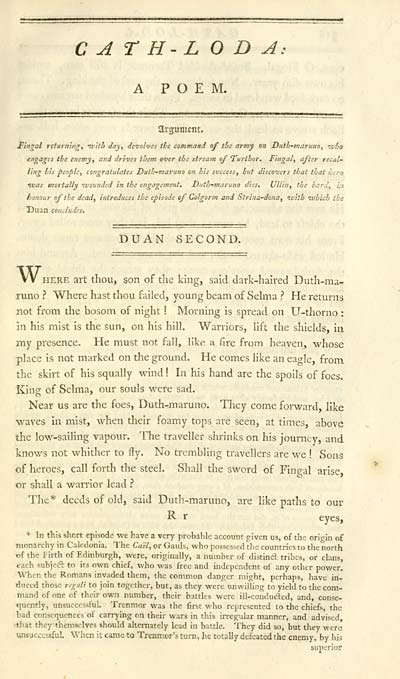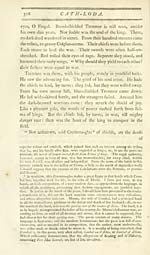Download files
Complete book:
Individual page:
Thumbnail gallery: Grid view | List view

C A T H' L D A:
A POEM.
argument.
Ilngal rtturn'mg, "iclth day, devolves the command of the army on Duth-martmoy ivba
engages the enemy, and drives them over the stream of Turihor. Fingal, after recal-
ling his people, congratulates Duth-maruno on his success, but discovers that that hero
•was mortally •wounded in the engagement. Duth-maruno dies, Ullin, the herd, i/i
honour of the dead, introduces the episode of Colgorm and Strina-dona, ivitb ivhich the
Diian concludes.
DUAN SECOND.
W HERE art thou, son of the khig, said dark-haired Duth-ma-
runo ? Where hast thou failed, young beam of Sehna ? He returns
not from the bosom of night ! Morning is spread on U-thorno :
in his mist is the sun, on his hill. Warriors, lift the shields, in
my presence. He must not fall, like a fire from heaven, whose
place is not marked on the ground. He comes like an eagle, from
the skirt of his squally wind ! In his hand are the spoils of foes.
King of Selma, our souls were sad.
Near us are the foes, Duth-maruno. They come forward, like
waves in mist, when their foamy tops are seen, at times, above
the low-sailing vapour. The traveller shrinks on his journey, and
knows not whither to fly. No trembling travellers are we ! Sons
of heroes, call forth the steel. Shall the sword of Fingal arise,
or shall a warrior lead ?
The* deeds of old, said Duth-maruno, are like paths to our
R r eyes,
* In this short episode we have a very probable account given us, of the origin of
monarchy in Caledonia. The Cael, or Gauls, who possessed the countries to the north
of the Firth of Edinburgh, were, originally, a number of distind tribes, or clans,
each subjed to its own chief, who was free and independent of any other power.
W'hen the Romans invaded them, the common danger might, perhaps, have in-
duced those nguli to join together, but, as they were unwilling to yield to the com-
mand of one of their own number, their battles were ill-condudted, and, conse-
quently, unsuccessful. Trenmor was the first who represented to the chiefs, the
bad consequences of carrying on their wars in this irregular manner, and advised,
'that they themselves should alternately lead in battle. They did so, but they were
unsuccessful. When it came to Trenmor's turn, he totally defeated the enemy, by his
superior
A POEM.
argument.
Ilngal rtturn'mg, "iclth day, devolves the command of the army on Duth-martmoy ivba
engages the enemy, and drives them over the stream of Turihor. Fingal, after recal-
ling his people, congratulates Duth-maruno on his success, but discovers that that hero
•was mortally •wounded in the engagement. Duth-maruno dies, Ullin, the herd, i/i
honour of the dead, introduces the episode of Colgorm and Strina-dona, ivitb ivhich the
Diian concludes.
DUAN SECOND.
W HERE art thou, son of the khig, said dark-haired Duth-ma-
runo ? Where hast thou failed, young beam of Sehna ? He returns
not from the bosom of night ! Morning is spread on U-thorno :
in his mist is the sun, on his hill. Warriors, lift the shields, in
my presence. He must not fall, like a fire from heaven, whose
place is not marked on the ground. He comes like an eagle, from
the skirt of his squally wind ! In his hand are the spoils of foes.
King of Selma, our souls were sad.
Near us are the foes, Duth-maruno. They come forward, like
waves in mist, when their foamy tops are seen, at times, above
the low-sailing vapour. The traveller shrinks on his journey, and
knows not whither to fly. No trembling travellers are we ! Sons
of heroes, call forth the steel. Shall the sword of Fingal arise,
or shall a warrior lead ?
The* deeds of old, said Duth-maruno, are like paths to our
R r eyes,
* In this short episode we have a very probable account given us, of the origin of
monarchy in Caledonia. The Cael, or Gauls, who possessed the countries to the north
of the Firth of Edinburgh, were, originally, a number of distind tribes, or clans,
each subjed to its own chief, who was free and independent of any other power.
W'hen the Romans invaded them, the common danger might, perhaps, have in-
duced those nguli to join together, but, as they were unwilling to yield to the com-
mand of one of their own number, their battles were ill-condudted, and, conse-
quently, unsuccessful. Trenmor was the first who represented to the chiefs, the
bad consequences of carrying on their wars in this irregular manner, and advised,
'that they themselves should alternately lead in battle. They did so, but they were
unsuccessful. When it came to Trenmor's turn, he totally defeated the enemy, by his
superior
Set display mode to: Large image | Transcription
Images and transcriptions on this page, including medium image downloads, may be used under the Creative Commons Attribution 4.0 International Licence unless otherwise stated. ![]()
| Early Gaelic Book Collections > Ossian Collection > Poems of Ossian, the son of Fingal > (329) |
|---|
| Permanent URL | https://digital.nls.uk/77927170 |
|---|
| Description | Selected books from the Ossian Collection of 327 volumes, originally assembled by J. Norman Methven of Perth. Different editions and translations of James MacPherson's epic poem 'Ossian', some with a map of the 'Kingdom of Connor'. Also secondary material relating to Ossianic poetry and the Ossian controversy. |
|---|
| Description | Selected items from five 'Special and Named Printed Collections'. Includes books in Gaelic and other Celtic languages, works about the Gaels, their languages, literature, culture and history. |
|---|

